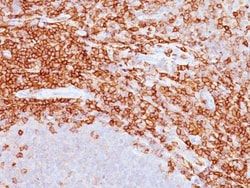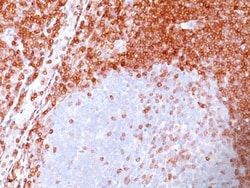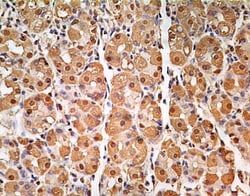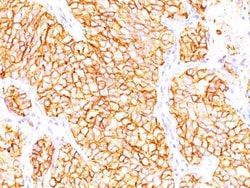Carbonic Anhydrase IX/CA9 Antibody (66.4.C2 (PN-15)), Novus Biologicals™
Manufacturer: Fischer Scientific
Select a Size
| Pack Size | SKU | Availability | Price |
|---|---|---|---|
| Each of 1 | NBP21519902-Each-of-1 | In Stock | ₹ 56,159.00 |
NBP21519902 - Each of 1
In Stock
Quantity
1
Base Price: ₹ 56,159.00
GST (18%): ₹ 10,108.62
Total Price: ₹ 66,267.62
Antigen
Renal Cell Carcinoma (gp200)
Classification
Monoclonal
Concentration
0.2mg/mL
Dilution
Western Blot 0.5-1ug/ml, Flow Cytometry 0.5-1ug/million cells, ELISA 1-5ug/ml for coating, Immunocytochemistry/Immunofluorescence 1-2ug/ml, Immunoprecipitation 1-2ug/500ug protein lysate, Immunohistochemistry-Paraffin 0.5-1ug/ml, Immunohistochemistry-Frozen 0.5-1ug/ml
Gene Accession No.
Q16790
Gene Symbols
LY75
Immunogen
Fresh, normal human renal cortical tissue homogenate was used as immunogen to generate the RCC antibody.
Quantity
0.2 mg
Research Discipline
Dendritic Cell Markers, Ovarian Carcinoma Cell Markers, Renal Cell Carcinoma Cell Markers
Gene ID (Entrez)
4065
Target Species
Human, Equine
Form
Purified
Applications
Western Blot, Flow Cytometry, ELISA, Immunocytochemistry, Immunofluorescence, Immunoprecipitation, Immunohistochemistry (Paraffin)
Clone
66.4.C2 (PN-15)
Conjugate
Unconjugated
Formulation
PBS with 0.05% BSA. with 0.05% Sodium Azide
Gene Alias
CD205LY-75, CLEC13BLy-75, C-type lectin domain family 13 member B, DEC-205CD205 antigen, GP200-MR6, lymphocyte antigen 75
Host Species
Mouse
Purification Method
Protein G purified
Regulatory Status
RUO
Primary or Secondary
Primary
Test Specificity
Recognizes a glycoprotein of ∼200kDa, identified as carbonic anhydrase IX (CAIX/gp200). Its epitope resides in the carbohydrate domain of gp200. It shows no significant cross-reactivity with other carbohydrate determinants, such as the Lewis blood group antigens, epithelial membrane antigen, HMFG, and AB blood group antigens. In normal kidney, gp200 is localized along the brush border of the pars convoluta and pars recta segments of the proximal tubule, as well as focally along the luminal surface of Bowman's capsule adjoining the outgoing proximal tubule. Reportedly, gp200 is expressed by 93% of primary and 84% of metastatic renal cell carcinomas. This MAb may be useful in the investigations of carcinomas of proximal nephrogenic differentiation especially those showing tubular differentiation.
Content And Storage
Store at 4C.
Isotype
IgG2b κ
Description
- Carbonic Anhydrase IX/CA9 Monoclonal specifically detects Carbonic Anhydrase IX/CA9 in Human, Equine samples
- It is validated for Western Blot, Flow Cytometry, Immunohistochemistry, Immunocytochemistry/Immunofluorescence, Immunohistochemistry-Paraffin.





